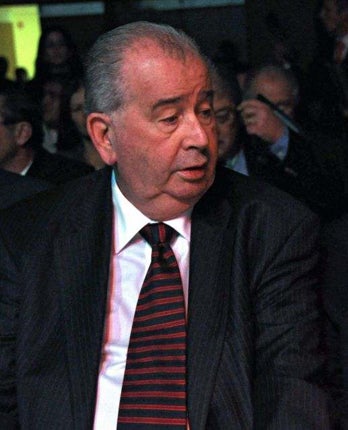Argentine FA hoping new TV deal will save ailing clubs

The Argentine Football Association on Tuesday broke a contract granting television rights to a local company, hoping to land a new, more lucrative deal to broadcast the country's matches. The decision to dump rights-holding company TSC came as Argentine officials try to rescue debt-ridden clubs whose financial woes have delayed the start of the season.
Officials say the league will now begin on 21 August, a week after it was originally scheduled, but did not identify who might buy the broadcast rights. "The AFA is ready to open any negotiation," AFA spokesman Ernesto Cherquis Bialo told reporters. Argentinian media reported the government was considering a possible takeover of the TV rights and Bialo did not rule out a possible deal with the state.
Under the old contract, clubs received $70m (£42m) a year for televised games shown on cable and pay-per-view TV.
The AFA halted the start of the season after the union representing footballers said players were owed more than $8m by several clubs.
Fans are angry over the delay to the season and many accuse club bosses of incompetence and corruption.
"A Sunday without soccer isn't a Sunday," said Jose Roldan, a tour guide at Boca Juniors, Argentina's best-known club. "Clubs are being mismanaged," he said, standing beside a statue of Diego Maradona, who as a player led Argentina to their second World Cup in 1986 and now coaches the national team. Boca Juniors, along with other first division clubs such as River Plate, Independiente and Racing, are mired in debt because of broadcast rights, government controls and payments they make to official fan clubs known as "barras bravas".
AFA president Julio Grondona has said seven first division teams and 10 second division clubs owe their players money.
The first division clubs, which have racked up debts of some $184m, say the world economic downturn has forced them to sell players to European teams for a fraction of their true market value.
Club owners and AFA officials say the only solution is to more than double what they charge for TV rights, but broadcaster Torneos y Competencias, or TyC, rejected the plan.
"We're no longer going to be the cow the AFA milks every time they need money," TyC president Marcelo Bombau said before the AFA's decision was announced. "They're asking us for a 200 per cent increase in a week – it's impossible." TSC, the company that holds the televised rights, is a partnership between TyC and Argentina's largest media conglomerate Grupo Clarin.
The government has helped struggling clubs with a 10-year, low-interest repayment plan on nearly $80m in overdue taxes, but it was not enough to ease their cash troubles.
Join our commenting forum
Join thought-provoking conversations, follow other Independent readers and see their replies
Comments
Bookmark popover
Removed from bookmarks